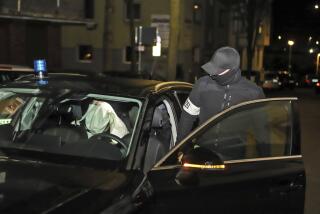In Rome, Police Crimp Pickpocket Sprees
- Share via
ROME — Taking cover behind a clump of oleander bushes, two men peer intently toward the shadowy arches of the Colosseum across the street.
Plaid shirttails cover one man’s gun. From his partner’s leather jacket come binoculars to make sure they don’t miss a move.
Suddenly the binoculars go down and a yell comes from one of the watchers: “He took it. Let’s go.”
The “it” is a Minolta camera that Silke Ade, a 21-year-old nursing student from Germany, put down beside her as she spread out a map on a cool stump of marble column.
The taker is a suspected pickpocket and the watchers are a team from Rome’s plainclothes anti-pickpocket police.
Dodging cars and buses, the officers dart across the street. Giuseppe Capurro handcuffs the suspect. Giuseppe “Pino” Agostinacchio presents Ade with her camera so fast she says she thought he was the thief.
The seasoned team makes the arrest look easy. But a day tailing Capurro and Agostinacchio around the hot city finds it’s no Roman holiday tracking professional pickpockets who prey on distracted tourists.
Police get about 3,000 reports of theft by pickpockets each year--nearly 10 a day afflicting foreigners, Italian out-of-towners and Romans. They say thefts appear to have gone down since the special patrols began a few years ago.
Like the cops, the thieves are trained and work in teams.
Police break down pickpocket gangs by groups. Capt. Luciano Torchia, who directs the plainclothes squads, said Chilean and Peruvian thieves, often sporting baseball caps, knapsacks and maps to look like tourists, tend to work mass transit. Algerians, who favor the businessman’s look, stalk tourist sites.
The man arrested outside the Colosseum was a middle-age Algerian in a gray wool suit and impeccably pressed cotton shirt.
Italians don’t seem to go in much for pickpocketing, concentrating on car thefts and apartment break-ins, police say.
Foreign pickpockets are usually ordered expelled after serving jail sentences, but many slip back into Italy. Sentences are short: two or three months for a first offense, maybe a year for repeat offenders.
Capurro, 32, in brown corduroy slacks, and Agostinacchio, 30, in well-worn jeans, look like soccer fans going to a match instead of Carabinieri paramilitary police who usually wear red-striped black pants and jackets.
They like to get the lay of the land by strolling to Rome’s main train station, a casbah of beggars and hustlers mingling with harried and sometimes confused travelers.
After a few years of working the beat, they have the faces memorized. Capurro spots two women sitting on a curb near the bus depot outside the station. He says they are Peruvian pickpockets.
“On vacation?” Capurro asks cheerily.
“We’re resting,” one replies.
The officers haven’t witnessed the women do anything, so can only let them know they’ve been spotted.
Bus lines that cross the heart of Rome are notorious for pickpockets. The No. 64, for example, is considered so risky a ride between the Vatican and the train station that some American residents have dubbed it “the heaven to hell” express.
Capurro and Agostinacchio ride the subway back and forth a few stops, but the only face they recognize is another undercover cop’s.
More to Read
Sign up for Essential California
The most important California stories and recommendations in your inbox every morning.
You may occasionally receive promotional content from the Los Angeles Times.













